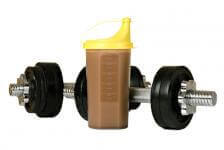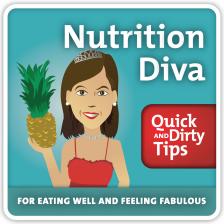How Much Protein Should You Eat?
Can eating more protein help you eat less, lose weight, and build more muscle?

For more up-to-date information on healthy eating, check out my new guidebook, Nutrition Diva’s Secrets for a Healthy Diet. Read a free chapter here.
Why Should You Eat Protein?
The news about protein is pretty good. Most of the things you’ve heard are actually true—although there is a fair amount of fine print that gets overlooked. Fine print, as you know, is my specialty. So let’s get out the opera glasses and take a closer look at the claims about protein.
Claim #1: Protein Speeds Up Your Metabolism and Burns Fat and Calories
This one’s true. Protein has a number of documented effects on your metabolism: It’s been shown to increase thermogenesis, decrease energy efficiency, and improve the metabolism of fats…all of which can help you use up more calories than you otherwise would.
The fine print with this one has to do with the magnitude of these effects. The ways these studies are reported in the press can be misleading. For example, here’s an example I found on the Internet: “A study in the Journal of [Human] Nutrition and Dietetics found that high protein meals significantly improved fat metabolism.”
Now, when most of us hear that something made a significant difference, we understand that to mean that the difference was meaningful—because that’s the way we use this word in regular life. But when statisticians say that a finding was “significant,” they’re only saying they’re 95% sure that it wasn’t just due to chance or random variation. In other words, an effect may be statistically significant without being terribly meaningful in the real world.
So, while it may be technically true that eating more protein will cause you to burn more calories, it might take a year or two for those extra calories to add up to just one pound of weight loss. Still, every little bit counts.
Claim #2: Eating More Protein Helps You Eat Less
This may be true. Higher protein meals tend to keep you satisfied for longer—and this can be helpful for those who are trying to watch their calories. Let’s say you’re trying to lose a few pounds, so you cut back on calories. As a result, you’ll probably feel some hunger. At this point, it can go one of two ways. Either you cave in and eat, thwarting your weight loss efforts. Or, you stick to your diet and manage to lose some weight but you’re hungry and miserable the whole time.
Eating more protein when cutting calories keeps you from feeling quite as hungry, and this can make your weight loss attempts either more successful, less unpleasant, or both.
In practical terms, this means that when you’re looking for calories to cut, you want to cut the fats and carbohydrates first. Rather than of cutting your usual breakfast in half and eating one egg and one piece of toast, try eating two eggs and no toast. Instead of eating half a hamburger and bun, eat the whole burger but skip the bun. You get the idea.
Claim #3: Eating More Protein Will Help You Build Muscle

But it doesn’t take as much as you may have been led to believe. Researchers recently measured the effects of protein on muscle synthesis by feeding people steaks and then measuring the rate at which their bodies built new muscle tissue after the meal.
They found that muscle synthesis went up by 50% after eating the beef. But 4 ounces of beef worked just as well as 12-ounces.
Is There a Downside to Eating More Protein?
You may have read that high-protein diets can strain your kidneys. If you have kidney disease, it’s true that a high-protein diet is definitely not for you; but there’s little evidence to suggest that people with healthy kidneys have anything to fear.
It is true that eating more protein can be dehydrating, which will cause your urine to become more concentrated. But this isn’t a sign of kidney damage—in fact, it’s just the opposite. Concentrated urine is a sign that the kidneys are doing exactly what they’re supposed to be doing. Drinking more water is a relatively easy way to deal with the dehydrating effects of high protein diets.
Protein also has an acidifying effect. As I explained in episode #43, the problem is not that your body or blood will become too acidic; your body will quickly intervene to normalize your pH. However, it does that by drawing calcium from your bones, which could potentially lead to thinning bones. The solution is to be sure to get enough calcium.
How Much Protein Should You Eat?
The Institute of Medicine recommends that protein make up 10 to 35% of your calories. That’s a pretty wide range. The lower end of the range represents the amount you need to keep your body functioning. To take full advantage of the fat-burning, appetite-regulating, and lean-muscle-building effects of protein, you’d probably want to shoot for the higher end of that range. But I don’t believe there’s much to be gained from going any higher than that.
To get a third of your calories from protein, eat approximately one gram of protein for every pound you weigh.
I’m going to save you a lot of math and give you a simple rule of thumb. To get about a third of your calories from protein, eat approximately one gram of protein for every pound you weigh. If you think in kilograms, you’ll eat about 2 grams for every kilogram you weigh. If you measure your weight in stones, you are on your own. I have never understood what that meant. For more on calculating how much protein you should eat, check out this Quick Tip of mine.
How to Meet Your Protein Quota
It’s certainly possible to meet your protein needs using regular foods like eggs, meat, nuts, soy, and dairy foods. (Vegetarians will have to work a little harder.) You can also use protein powders or shakes if you find them convenient, but my advice is to keep it simple. Look for a plain protein powder with a minimum amount of added nutrients, herbs, sweeteners, flavorings, or other ingredients.
For best results, spread your protein throughout the day, having some at every meal and snack. Not only will your body be able to make better use of the protein, but you won’t have to eat a two-pound steak for dinner. I’ll put a link in the show notes to some resources that list how much protein is in common foods so you can get a sense of what it would take to meet your daily quota.
Quick and Dirty Tip: You can’t lose weight by eating more calories, even if the extra calories are protein. (Protein’s got some good stuff going for it but it’s not magical.) If you are increasing your protein intake and you don’t want to gain weight, make sure to cut back on the amount of other foods you’re eating.
Click here to get my recipe for quinoa salad with pecans and cranberries.
Administrative

Post comments and questions here or on my Nutrition Diva Facebook Page. I can also be found on Twitter. I answer a lot of listener questions in my free weekly newsletter, so if you’ve sent a question my way, be sure you’re signed up to receive that.
Have a great day and eat something good for me!
References
Dietary protein intake and renal function


